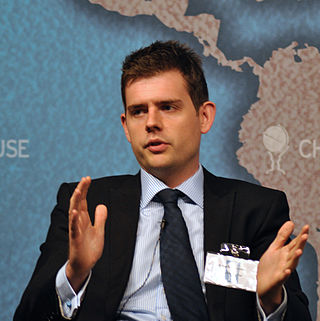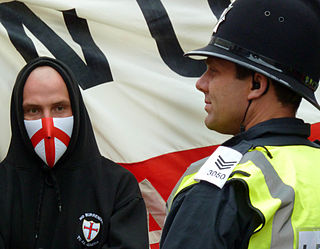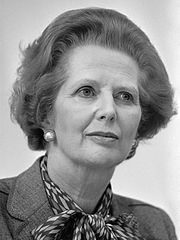The Conservative Party, officially the Conservative and Unionist Party and colloquially known as the Tories, is one of the two main political parties in the United Kingdom, along with the Labour Party. It is the current governing party, having won the 2019 general election, and has been the primary governing party in the United Kingdom since 2010. The party sits on the right-wing to centre-right of the political spectrum. It encompasses various ideological factions including one-nation conservatives, Thatcherites, and traditionalist conservatives. The party holds the annual Conservative Party Conference, at which senior Conservative figures promote party policy.

Thatcherism is a form of British conservative ideology named after Conservative Party leader Margaret Thatcher that relates to not just her political platform and particular policies but also her personal character and style of management while in office. Proponents of Thatcherism are referred to as Thatcherites. The term has been used to describe the principles of the British government under Thatcher from the 1979 general election to her resignation in 1990, but it also receives use in describing administrative efforts continuing into the Conservative governments under John Major and David Cameron throughout the 1990s and 2010s. In international terms, Thatcherites have been described as a part of the general socio-economic movement known as neoliberalism, with different countries besides the United Kingdom sharing similar policies around expansionary capitalism.

The UK Independence Party is a Eurosceptic, right-wing populist political party in the United Kingdom. The party reached its greatest level of success in the mid-2010s, when it gained two members of parliament and was the largest party representing the UK in the European Parliament. The party is currently led by Neil Hamilton.
The Referendum Party was a Eurosceptic, single-issue political party that was active in the United Kingdom from 1994 to 1997. The party's sole objective was for a referendum to be held on the nature of the UK's membership of the European Union (EU). Specifically, it called for a referendum on whether the British electorate wanted to be part of a federal European state or to revert to being a sovereign nation that was part of a European free-trade bloc without wider political functions.
The Bruges Group is a think tank based in the United Kingdom. Founded in 1989, it advocates for a restructuring of Britain's relationship with the European Union and other European countries. Its members and staff campaign against the notion of an "ever-closer union" in Europe and, above all, against British involvement in a single European state. The group is often associated with the Conservative Party, including MPs such as Iain Duncan Smith, Daniel Hannan, John Redwood, and Norman Lamont. However, it is formally an independent all-party think tank, and some Labour MPs and peers have cited the publications or attended the meetings of the Bruges Group through the years, such as Frank Field, Gisela Stuart, Lord Stoddart of Swindon and Lord Shore of Stepney.
The Freedom Association (TFA) is a pressure group in the United Kingdom that describes itself as "a non-partisan, classically liberal campaign group", which has links to the Conservative Party and UK Independence Party (UKIP). TFA was founded in 1975 as the National Association for Freedom (NAFF) and gained public prominence through its anti-trade union campaigns. Its popularity grew after campaigning against perceived abuses to individual freedom including big business, big government, organised labour and Irish political violence. By the end of the 1970s the organisation had around 20,000 members.
In the United Kingdom, the word liberalism can have any of several meanings. Scholars primarily use the term to refer to classical liberalism. The term can also mean economic liberalism, social liberalism or political liberalism. It can simply refer to the politics of the Liberal Democrats, a UK party formed from the merger of two centrist parties in 1988. Liberalism can occasionally have the imported American meaning; however, the derogatory connotation is much weaker in the UK than in the US, and social liberals from both the left and right wing continue to use liberal and illiberal to describe themselves and their opponents, respectively.
Centre-right politics lean to the right of the political spectrum, but are closer to the centre. Parties of the centre-right generally support liberal democracy, capitalism, the market economy, private property rights, and a modest welfare state. They support conservatism and economic liberalism and oppose socialism and communism.

John Douglas Wilson Carswell is a British former politician who served as a Member of Parliament from 2005 to 2017, co-founded Vote Leave and currently serves as president and CEO of the Mississippi Center for Public Policy.

Euroscepticism in the United Kingdom is a continuum of belief ranging from the opposition to certain political policies of the European Union to the complete opposition to the United Kingdom’s membership of the European Union. It has been a significant element in the politics of the United Kingdom (UK). A 2009 Eurobarometer survey of EU citizens showed support for membership of the EU was lowest in the United Kingdom, alongside Latvia and Hungary.

The English Defence League (EDL) is a far-right, Islamophobic organisation in England. A social movement and pressure group that employs street demonstrations as its main tactic, the EDL presents itself as a single-issue movement opposed to Islamism and Islamic extremism, although its rhetoric and actions target Islam and Muslims more widely. Founded in 2009, its heyday lasted until 2011, after which it entered a decline.

Matthew James Goodwin is a British academic who is professor of politics in the School of Politics and International Relations at the University of Kent. His publications include National Populism: The Revolt Against Liberal Democracy and Values, Voice and Virtue: The New British Politics.
Conservatism in the United Kingdom is related to its counterparts in other Western nations, but has a distinct tradition and has encompassed a wide range of theories over the decades of conservatism. The Conservative Party, which forms the mainstream right-wing party in Britain, has developed many different internal factions and ideologies.

Europe of Freedom and Direct Democracy was a Eurosceptic and populist political group in the European Parliament. The EFDD group was a continuation for the Eighth European Parliament of the Europe of Freedom and Democracy (EFD) group that existed during the Seventh European Parliament, with significant changes to group membership.

The United Kingdom was a member state of the European Union (EU) and of its predecessor the European Communities (EC) – principally the European Economic Community (EEC) from 1 January 1973 until 31 January 2020. Since the foundation of the EEC, the UK had been an important neighbour and then leading member state, until Brexit ended 47 years of membership. During the UK's time as a member state two referendums were held on the issue of its membership, with the first being held on 5 June 1975, resulting in a vote to stay in the EC, and the second, held on 23 June 2016, which resulted in the vote to leave the EU.

The European Research Group (ERG) is a research support group and caucus of Eurosceptic Conservative Members of Parliament of the United Kingdom. The journalist Sebastian Payne described it in the Financial Times as "the most influential [research group] in recent political history".

Reform UK is a right-wing populist political party in the United Kingdom. It was founded with support from Nigel Farage in November 2018 as the Brexit Party, advocating hard Euroscepticism and a no-deal Brexit. It was a significant political force at the 2019 European Parliament election, but failed to win any seats at the 2019 general election. After the UK's withdrawal from the European Union (EU) on 31 January 2020, it was renamed to Reform UK, and it became primarily an anti-lockdown party during the COVID-19 pandemic. Subsequently, in December 2022, it began campaigning on broader right-wing populist themes during the British cost-of-living crisis.

The size of the EDL movement has been difficult to gauge. Allen noted that within a year and a half of the group's formation it had "grown substantially" but that it is "extremely difficult to know exactly how big or how well supported the EDL is." The organisation has no official system of membership, or formal means of joining, and thus no membership list. In 2011, Bartlett and Littler estimated that between 25,000 and 35,000 people were active members in the EDL movement. They believed that about half of these had attended demonstrations and that the highest concentration was in the Greater London area. On the basis of her research with the group, Pilkington suggested that there was a "high turnover in the movement", while Winlow, Hall, and Treadwell observed that members "drift in and out of its activities". The internet hacktivist group Anonymous has published personal details of EDL members as part of a campaign against the group.

The social history of the United Kingdom (1979–present) began with Conservative Prime Minister, Margaret Thatcher (1979–1990) entering government and rejecting the post-war consensus in the 1980s. She privatised most state-owned industries and worked to weaken the power and influence of the trade unions. The party remained in government throughout most of the 1990s albeit with growing internal difficulties under the leadership of Prime Minister John Major (1990–1997).











